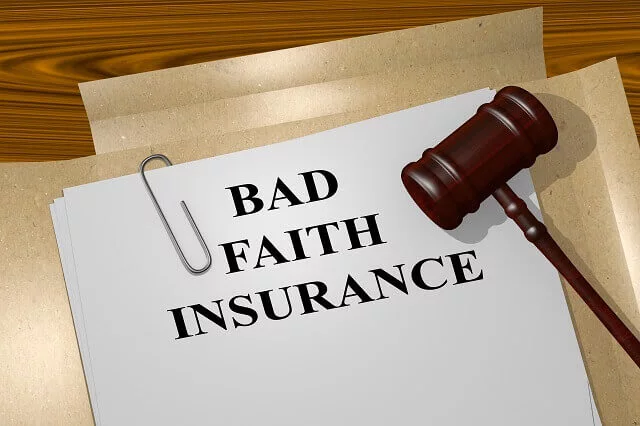
While you expect your insurance company to provide coverage when you need it, the reality is that this frequently does not happen. Insurance companies deny their policyholders’ claims for a variety of different reasons, many of which cross the line and amount to insurance bad faith.
If you have been denied coverage under your auto insurance or homeowner’s insurance policy, what should you do? Should you sue your insurance company? If so, what do you need to know?
Dealing with an insurance claim can be challenging, and when your insurance company denies your claim in bad faith, it can be downright frustrating. It can also be costly if you are left without a working vehicle or if your home sustains further damage while you are waiting for your insurance coverage to come through. If your insurance company has denied your claim in bad faith, or if it is delaying the processing of your claim in bad faith, you may have grounds to file a lawsuit and you should speak with an attorney, promptly.
Understanding Your Legal Rights Following a Bad-Faith Insurance Claim Denial
Do you have questions about suing your insurance company for bad faith? If so, here are seven resources you can use to learn more about your legal rights:
1. Valid Reasons for Home and Auto Insurance Claim Denials
Not every insurance claim denial amounts to bad faith. From “excluded perils” to non-payment of premiums, and from waiting too long to file your claim to failing to present adequate evidence to secure coverage, there are various reasons why insurance companies can legitimately deny their policyholders’ claims. Before you decide to pursue a case for bad faith, it will be important to make sure that (i) your claim is covered, and (ii) you have done everything necessary in order to file a valid claim.
Learn more: When Can an Insurance Company Deny Coverage for Personal Injury or Property Damage?
2. Your Insurance Company’s Legal Obligations When You File a Valid Claim
In order for an insurance claim denial to be considered “bad faith,” your insurance company must fail to meet one or more of its contractual commitments or its obligations under the insurance laws in your state. For example, when processing policyholders’ claims, insurance companies must:
- Conduct a full investigation promptly;
- Consider all pertinent evidence in support of your claim; and,
- Communicate with the policyholder in a clear and timely manner.
These are just a few of the numerous good-faith obligations that insurance companies owe to their customers, and any deviation from the good-faith standards established under your policy or your state’s insurance laws can potentially support a claim for damages.
Learn more: What is Bad Faith?
3. Examples of Bad-Faith Insurance Practices in Oregon and Washington
If those are examples of required good-faith insurance practices, then what constitutes bad faith? The Oregon Revised Statutes and Washington Insurance Fair Conduct Act (IFCA) both contain laundry lists of practices that amount to insurance bad faith. Some examples include:
- Misrepresenting facts or policy provisions;
- Failing to promptly respond to communications;
- Refusing to pay claims without conducting a reasonable investigation;
- Compelling claimants to initiate litigation to recover amounts due; and,
- Attempting to settle claims for unreasonable amounts.
Learn more: When Does a Payment Delay or Denial Amount to Insurance Bad Faith?
4. More Red Flags for Insurance Bad Faith
If you file a bad-faith insurance lawsuit, your attorney will be able to request records through the discovery process that may shed light on some additional red flags for unlawful insurance practices. These red flags might not necessarily be readily apparent from your claim itself, but rather may be demonstrated by history or pattern of bad-faith delay and denial tactics. For example, if adjusters are instructed to automatically deny every claim regardless of the circumstances involved, this would generally be indicative of bad-faith insurance claim processing.
Learn more: Bad Faith Warning Signs
5. Proving Bad Faith and Filing a Claim for Damages
There are a number of ways to prove that an insurance company has acted in bad faith, although the specific options that are available will depend on the circumstances involved and the state in which you live (Oregon and Washington have different definitions of insurance bad faith). In any case, you will need to work with an experienced attorney, and you will want to get started as soon as possible.
Learn more: What Are My Options If the Insurance Company Won’t Pay?
6. Do You Have a Legitimate Coverage Dispute or a Bad-Faith Insurance Claim?
As mentioned above, while there are numerous examples of bad-faith insurance practices, there are also various reasons why insurance companies can legitimately deny their policyholders’ claims. When assessing your options, your attorney will need to determine whether you have a legitimate coverage dispute or a bad-faith insurance claim. While both can potentially require legal action, dealing with a legitimate coverage dispute is very different from seeking compensation for insurance bad faith.
Learn more: Bad Faith in Auto Accident Insurance Claims: Know Your Rights
7. Steps to Take If You Believe Your Insurance Claim Has Been Improperly Delayed or Denied
If you believe that you may have a bad-faith insurance claim in Oregon or Washington, there are some important steps you need to take, and there are some equally-important mistakes you need to avoid. To help guide you as you move forward, we have prepared a list of tips for protecting your legal rights.
Learn more:
Request a Free Initial Consultation at D’Amore Law Group
If you would like personalized legal advice about filing a claim for insurance bad faith in Oregon or Washington, we encourage you to schedule a free initial consultation at D’Amore Law Group. To request an appointment with an attorney as soon as possible, call us directly or tell us about your situation online today.
